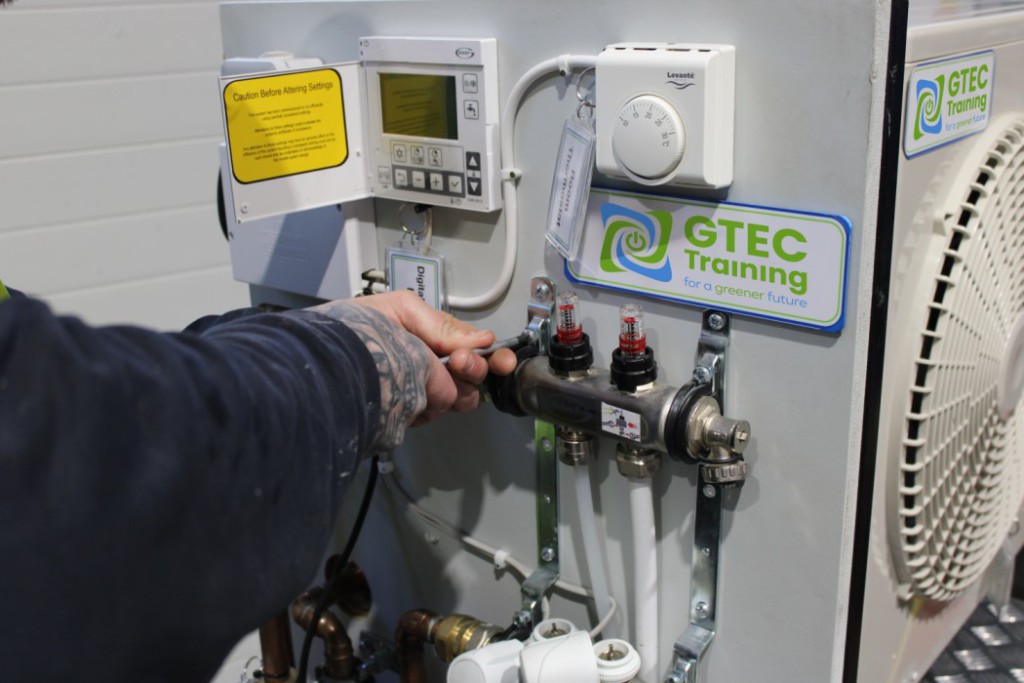Cutting through the noise…

Griff Thomas, Managing Director at GTEC & Heatly, both part of the United Living Group, looks at the positive landscape for heat pump engineers and why anyone still on the fence should really ignore last ditch attempts of sabotage by the heat pump hating section of the UK media.
There is a lot of noise surrounding heat pumps, but it is not caused by the heat pumps themselves – Nesta’s recent research into heat pump noise levels found that the average heat pump is no louder than a fridge or boiler. Rather, it comes from certain sections of the media that continue to trash heat pumps at any given opportunity in favour of hydrogen, the last hope of a dying and desperate gas industry.
This constant stream of negative press creates unease amongst consumers and installers and erodes confidence in low carbon technologies. It’s one reason the UK is struggling to hit its target of installing 600,000 heat pumps a year by 2028. A lack of skilled heat pump engineers is another critical pain point. If installers are despondent, it slows growth of the skilled workforce we need to roll out these systems.
Cut through the noise, however, and it’s clear that the transition to Net Zero is gathering pace with heat pumps at the helm. The latest figures from MCS look promising, we have a government that seems to be committed to sustainable house building and energy efficiency and the Heat Training Grant is back, making the cost of upskilling more affordable for installers.
Installations are on the rise
MCS has recently released heat pump installation data for the first six months of the year, which show a 45% increase compared to the same period last year with a total of 27,000 certified installations. It’s encouraging to see strong growth in demand with 2024 set to be the biggest year yet for heat pumps.
Policy drivers
The new government has a real opportunity to make progress on heat pumps over the next five years and beyond. Policies such as home upgrades and grants and low interest loans for domestic renewables, which will continue to drive demand for heat pumps. Meanwhile, the removal of planning restrictions surrounding heat pumps would remove a key barrier to adoption – Nesta’s research into noise levels supports this pathway.
The recently announced new towns programme has been described as the ‘largest housebuilding programme since the post-war period’, underscoring a commitment to sustainable house building that will also boost the heat pump sector, ensuring a growing stream of work for installers.
Innovations in training

We need to ramp up installations and ensure we have sufficient support in place to we need more qualified installers. Financial support is one factor (as mentioned, the Heat Training Grant is back, providing £500 vouchers towards the cost of heat pump training.)
Innovative models and industry partnerships are also key. It’s not just training centres and colleges offering accredited courses these days, some merchants, where engineers have access to all of the latest kit, are also delivering training, and manufacturers are partnering with training providers to create tailored courses that more specifically helps installers know the ins-and-outs of the latest technologies. Opportunities that wrap around renewables, like energy efficiency retrofit – insulation, draught proofing etc – allow installers to offer a 360° service and improve the outcomes of their heat pump installs.
Tech to the rescue
One of the biggest hurdles to heat pump deployment has been the complexity of specification – whole house surveying and heat loss calculations, in particular. Not only do these processes take a long time, accuracy is essential to ensure the correct heat pump size.
Technology is coming to the rescue here. Digital tools are revolutionising these processes and it won’t be long until the four to five hour heat pump survey becomes a thing of the past.
Not only will these tools benefit installers, they will also help consumers too, providing easier to understand information about their heat pump system, plus a central place for things like warranties etc.
The future is bright
Despite the media noise, evidence shows that heat pumps are a viable, quiet and efficient solution for the transition to Net Zero. The growing number of installations, supportive policies and advancements in training and technology indicate a promising future for heating engineers, with heat pumps leading the charge towards a sustainable low carbon heating sector.







